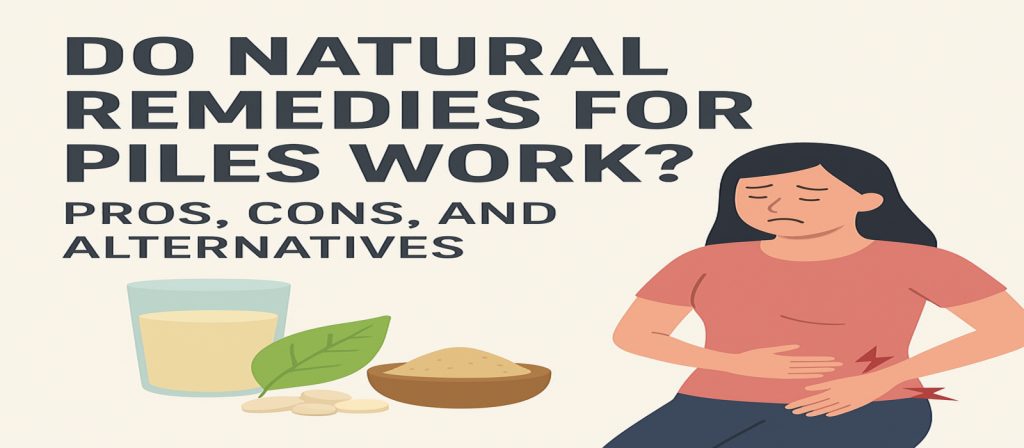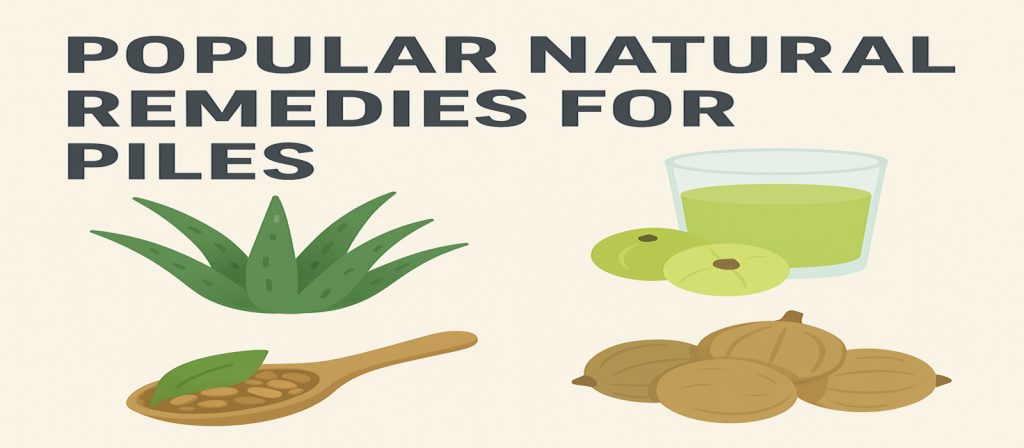
Introduction
In recent years, there has been a growing interest in natural and home-based remedies for managing everyday health problems, and piles—also known as hemorrhoids—are no exception. This condition, which affects millions of people, often brings along pain, itching, swelling, and a great deal of discomfort, making daily life difficult. For many, the first instinct is not to rush to a doctor but to try simple, natural solutions at home—whether it’s increasing fiber intake, using warm sitz baths, or applying herbal ointments. While these remedies may offer some relief, the big question remains: do they actually work, and are they enough to manage the condition effectively? In this blog, we take a closer look at the role of natural remedies for piles, weighing their pros and cons, and exploring other reliable treatment options that can help people find long-term relief and improve their quality of life.
Understanding Piles (Hemorrhoids)
Piles, also known as hemorrhoids, are swollen blood vessels in the rectum or anus that can cause significant discomfort and affect daily life. They can be broadly divided into two categories::
- Internal Hemorrhoids: These occur inside the rectum and are mostly painless, however they can bleed during bowel movements.
- External Hemorrhoids: Form under the skin around the anus, often leading to pain, itching, and swelling.
Common symptoms of piles include pain or discomfort, itching, bleeding during bowel movements, and swelling around the anus. Several risk factors contribute to their development, such as chronic constipation, a low-fiber diet, sedentary lifestyle, obesity, and pregnancy. Recognizing these symptoms and risk factors early can help in managing piles effectively and preventing them from becoming more severe.
Popular Natural Remedies for Piles

- Dietary Changes: Include high-fiber foods like fruits, vegetables, and whole grains to soften stools and prevent constipation.
- Hydration: Drink plenty of water throughout the day to ease bowel movements and reduce strain.
- Sitz Baths: Sitting in warm water helps reduce swelling, pain, and itching around the anus.
- Aloe Vera: Applying aloe vera gel topically provides a soothing effect and may reduce irritation.
- Witch Hazel: Known for its anti-inflammatory properties, it helps relieve pain and swelling.
- Coconut Oil: Acts as a natural moisturizer, easing dryness and irritation around hemorrhoids.
- Herbal Supplements: Options like Triphala or psyllium husk can support digestion and promote regular bowel movements.
Pros and Cons of Natural Remedies
Pros:
- Easy to try at home with simple lifestyle changes or natural products.
- Cost-effective compared to medical procedures or prescriptions.
- Minimal side effects when used correctly.
- Encourage healthier habits such as eating more fiber, staying hydrated, and exercising.
Cons:
- Not effective as a cure for advanced piles.
- Relief is often temporary and symptoms may return.
- Risk of delaying proper medical treatment if relied on too long.
- Some herbal supplements may interact with existing medications and cause complications.
When to See a Doctor
- If you notice blood in your stool or on the tissue regularly, it’s important to consult a doctor as it may signal piles or other serious conditions.
- When hemorrhoids cause intense pain, discomfort, or visible swelling that interferes with daily life, medical evaluation is necessary for timely and effective treatment.
- If natural remedies, lifestyle changes, or over-the-counter solutions don’t bring relief within weeks, professional medical care should be sought.
- When piles form painful blood clots, known as thrombosed hemorrhoids, immediate medical attention is crucial to prevent worsening and long-term issues.
Medical Alternatives to Natural Remedies

- Non-Surgical Treatments: Options like rubber band ligation (cutting blood supply to hemorrhoids), sclerotherapy (injecting medicine to shrink them), and infrared coagulation (using heat) are effective for mild to moderate cases.
- Surgical Treatments: For severe or recurring piles, procedures such as hemorrhoidectomy (removal of hemorrhoids) or laser surgery (a minimally invasive option with quicker recovery) may be recommended.
- Medications: Doctors may prescribe pain relievers, medicated ointments, and stool softeners to reduce discomfort, ease bowel movements, and support recovery alongside other treatments.
Preventing Piles: Lifestyle is Key
- Include fruits, vegetables, whole grains, and legumes to keep stools soft and prevent constipation, which is a major trigger for piles.
- Drinking enough water throughout the day supports digestion and makes bowel movements smoother, reducing unnecessary strain on the rectum.
- Physical activity improves blood circulation, prevents constipation, and helps maintain overall digestive health.
- Hemorrhoids can result from straining or spending too much time on the toilet, which puts more pressure on the rectal veins.
- Extra weight adds pressure to the pelvic region, so staying fit lowers the risk of developing piles and supports better long-term health.
Conclusion
Finding the right balance is key when it comes to managing piles effectively. Natural remedies, such as dietary changes, sitz baths, and herbal applications, may provide short-term relief and can be helpful in managing mild cases. However, they should never be seen as a complete substitute for professional medical treatment, especially in severe or recurring cases where proper diagnosis and advanced care are essential. The most effective approach combines healthy lifestyle changes—like maintaining a fiber-rich diet, staying hydrated, and avoiding prolonged sitting—with timely medical consultation to prevent complications and ensure long-term relief.
At Be Well Hospitals, our specialists offer advanced and compassionate care for piles, tailoring treatments to your specific needs. Don’t let discomfort disrupt your life. For long-lasting relief, visit our Piles Treatment webpage or call 9698 300 300 today and book your appointment. Take the first step toward lasting relief.
